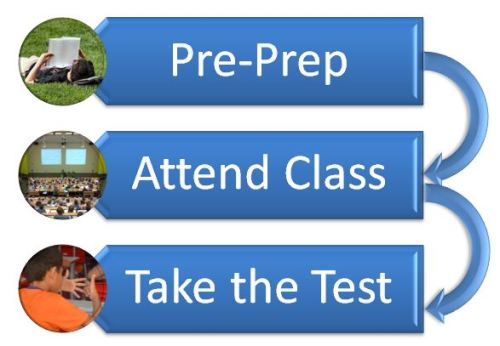I hate to break it to you but class isn’t over when it’s over. At least it shouldn’t be.
If you’re like many students, the typical course cycle is something like this:

But this process is flawed.
It’s missing the critical step known as reflection.
Reflection can be defined as both:
- a thought, idea, or opinion formed or a remark made as a result of meditation, and
- the consideration of some subject matter, idea, or purpose.
I’m not necessarily suggesting that you take up the practice of meditation (although there are many benefits to that as well) but I am advocating for you to incorporate some intentional thinking after class is dismissed.
The bottom line is that nobody understands everything the first time. I have encountered my share of frustrated students because they just didn’t “get it” immediately after class. That’s not usually the point. If a student was able to completely understand all elements of the content, theory or practice after pre-preparation (assuming that even happened) and one class discussion, I would gladly welcome her up to the front of the room to run the class for the rest of the semester.
I challenge you to schedule some time after your next class to reflect on what just happened. Grab a tea, an apple, a chocolate bar or whatever floats your boat and ask yourself these questions:
- What were the key takeaways of that class?
- What do I still not understand after class? And more importantly, what am I going to do about it?
- How does what was discussed or presented in class connect to what I am learning in this course or other courses?
- What over and above the course content did I learn today?
I guarantee you will get so much more out of your course experience if you build in an opportunity to reflect regularly. I’d love to hear how this practice is working for you.


